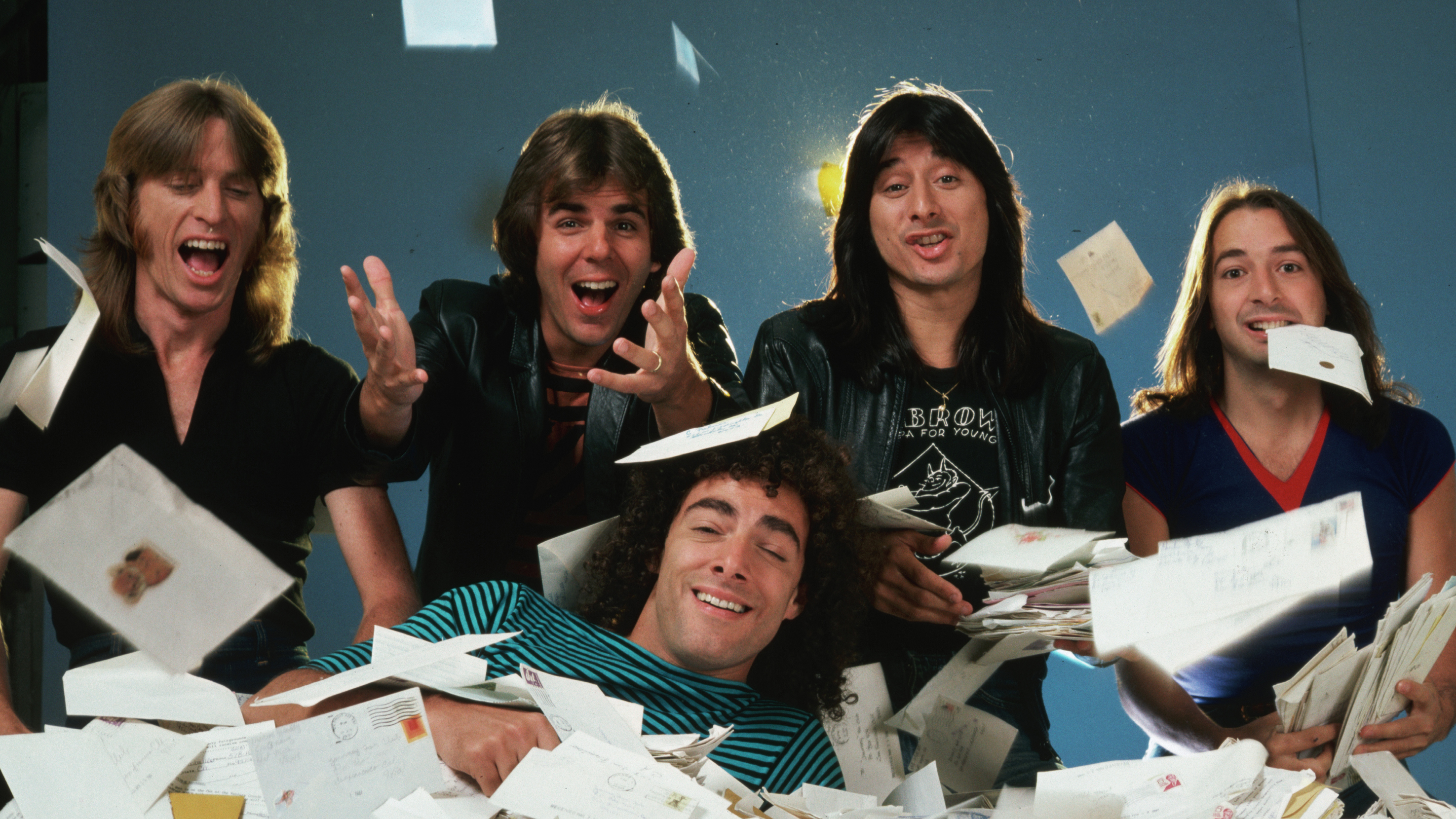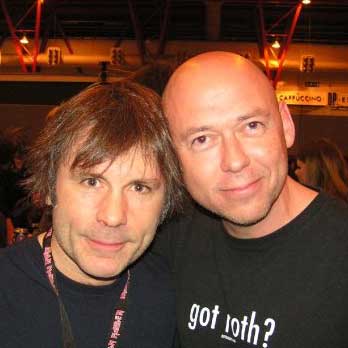“Journey wanted to make a musical change. Next thing I know I’m in Denver, Colorado with Neal Schon and we wrote our first song together that night”: How Steve Perry became the voice of Journey and took the band to its peak – before he had to bow out
At the moment Perry joined, the band was in danger of being dropped by Columbia Records

Want all the hottest music and gear news, reviews, deals, features and more, direct to your inbox? Sign up here.
You are now subscribed
Your newsletter sign-up was successful
When Journey celebrated their first No.1 album in 1981, it was no overnight success.
The album that hit the top, Escape, was the band’s seventh in a career that began with three successive flops that limped to No.138, No.100 and No.85 respectively.
So how did Journey make the huge leap from cult act to household name?
First, they decided on a drastic change in their music – switching from jazz-rock exploration to a song-based approach.
And then they got lucky by finding a singer destined to become one of the great rock voices of all time.
That singer was Steve Perry, and he saved the band’s career.
When Journey formed in San Francisco in 1973, the group was primarily a vehicle for guitar prodigy Neal Schon, a former member of Santana, as was Gregg Rolie, keyboard player and lead vocalist.
Want all the hottest music and gear news, reviews, deals, features and more, direct to your inbox? Sign up here.
Journey’s first three albums were also heavily influenced by Santana’s freeform style.
But after these albums stiffed, the band was in danger of being dropped by Columbia Records.
In 1977, Journey worked for a brief time with a new singer, Robert Fleischman. But when this came to nothing, the search for the right frontman led them to Perry.
In a 2018 interview with Classic Rock, Perry recalled how Journey’s approach followed in the wake of a tragedy.
“I was in a band called Street Talk, or the Alien Project as it was called at the time,” Perry said. “We’d been in contact with a guy named Don Ellis at Columbia Records. And then the bass player in my band, Richard Michaels, died in a car wreck. We lost him on the Fourth of July weekend.
“I got the phone call from Don Ellis. He said, ‘I’m so sorry. We really loved your band. We were going to sign you.’”
When Perry said that he considered his band finished, Ellis presented a new offer.
As Perry remembered it: “Don said, ‘Would you be interested at all in talking with some members of Journey? Because they want to make a musical change.’ I said, ‘Well, sure.’
“Next thing I know I’m in Denver, Colorado with Neal Schon and we wrote Patiently that night as we were rooming together. And that was the beginning…”
Perry said of Journey’s early albums: “In the beginning they were more like Mahavishnu [Orchestra], musicality-oriented players. They really wanted to be in that genre and be successful on those terms.”
But when he joined the band the focus had shifted.
“I would say that the band was making a concerted effort to try to be more song-oriented,” he said. “And I was so hungry to get into a band and tour and make records.”
The 1978 album Infinity was Perry’s first with the band. The album was produced by Roy Thomas Baker, then riding high from his success with Queen.
Perry’s expressive, high-arcing voice elevated songs such as Patiently, the bluesy ballad Lights and the powerful rock song Wheel In The Sky.
Gregg Rolie sang co-lead vocals on two tracks, Feeling That Way and Anytime. But Perry, with his range and finesse, was operating on a completely different level.
“I had a hunger and I think that drove me personally,” Perry told Classic Rock. “It seemed like it was a massive thing that I was so committed to."
Infinity reached No.21 on he US chart and went platinum. The band’s rise continuted with the 1979 album Evolution making No.20 and the 1980 album Departure reaching No.8, driven by radio hit Anyway You Want It.
Another pivotal moment came in 1980, when Gregg Rolie, as a parting gift, chose his successor – Jonathan Cain, who had starred alongside British singer John Waite in pop rock group The Babys.
Alongside Perry and Schon, Cain immediately established himself as a major songwriter within the band. He co-wrote every song on the Escape album, and as he later commented: “What changed about Journey is that we started writing about the people that cared about the band.”
Perry put it this way: “There are songs on the Infinity record that are amazing, and on Evolution and Departure. It just so happened that when we got to Escape, we were flying.”
Don’t Stop Believin’, an evocative tale of “streetlight people, living just to find emotion”, became an American classic.
Two beautiful ballads, Who’s Crying Now and Open Arms, also hit the US top 10.
The latter was written by Cain for The Babys, but rejected by John Waite as “total crap”. With Perry deep into it, it soared.
And across the album were other classic songs: Stone In Love, with Schon the swaggering guitar hero; and Mother, Father, with Perry delivering an emotional tour de force.
Escape made Journey the biggest band in America in 1981, and in their peak years came two other monumental albums.
1983’s Frontiers featured the ultimate heavy melodic rock anthem, Separate Ways (Worlds Apart), and the quintessential power ballad, Faithfully.
1986’s Raised On Radio, recorded at a then astronomical cost of $1m, was a perfect hybrid of soft rock and soul.
But in 1987, Steve Perry quit Journey.
As he explained to Classic Rock many years later: “Bands have a tendency to have a lot of moving parts, and then at some point, once they’re successful, whatever had glued them together can be some of the very things that shake them up and tear them apart.
“If you look back through history, that’s the pattern that keeps on repeating itself over and over again. Relationships in general I think have an expiration date, unless you really work at it.”
He added: “What I brought into the band when I joined was honest passion for it. And towards the end of our time together, I was concerned that I had lost my passion for it, and so I stopped. And for a long, long period of time that passion remained elusive.
“I know in my heart that when I joined that band I committed myself to it with a passion – to live or die to help make this work. But I had to be okay in my own skin without it. I literally had to walk away from it with a conviction without a back door built in. I had to let it go.”
When Perry quit, Journey went on hiatus as Schon and Cain formed the supergroup Bad English with John Waite.
In 1995, Perry reunited with Journey for one last album, Trial By Fire. Since then, the band has continued without him.
After a period with ex-Tall Stories singer Steve Augeri, the strangest thing happened, when Filipino Arnel Pineda was plucked from a Journey tribute act to front the real thing.
Steve Perry eventually returned from self-imposed exile with a solo album Traces in 2018.
While Perry was out of the spotlight, Don’t Stop Believin’ became more popular than ever after appearing in movies and in the finale episode of The Sopranos.
By 2024, Don’t Stop Believin’ had hit more than 2 billion streams on Spotify alone.
Why this song?
“I really don’t know,” Steve Perry said, “because with all my songs, I give them all the same heartfelt time as you would children.
“You try to give them the information they need to go out in the world and emotionally survive. That’s the way I see producing song by song.
“Why do some end up becoming something that the audience really gravitates to? Gee, I just don’t know.”

Paul Elliott has worked for leading music titles since 1985, including Sounds, Kerrang!, MOJO and Q. He is the author of several books including the first biography of Guns N’ Roses and the autobiography of bodyguard-to-the-stars Danny Francis. He has written liner notes for classic album reissues by artists such as Def Leppard, Thin Lizzy and Kiss. He lives in Bath - of which David Coverdale recently said: “How very Roman of you!”
You must confirm your public display name before commenting
Please logout and then login again, you will then be prompted to enter your display name.




![The Sopranos - Final Scene [Complete] [HD] - YouTube](https://img.youtube.com/vi/1x9YACdBUrU/maxresdefault.jpg)